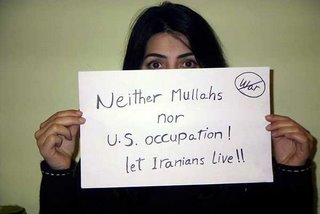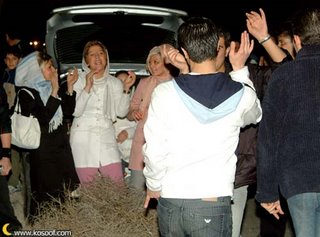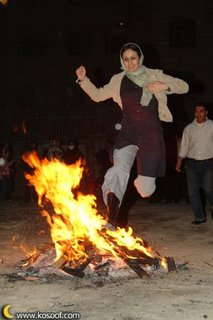 Signs of uncertainty point to possible attack on Iran
Signs of uncertainty point to possible attack on IranAs Iranians get ready to celebrate a 3,000-year tradition of Norouz, the Persian New year, a legacy from the ancient Persian Empire, they cannot hide their worries about the near future. They also are experiencing more inflation, while another shock this time comes not from the U.S. or the E-3, but from Japan, which has announced they want to reduce oil imports from Iran.Japan has always been one of Iran's best oil costumers. The corrupt and crisis-ridden Iranian economy is susceptible to a nasty shock like this that could send it into a tailspin. As the U.N. Security Council (UNSC) is still discussing how to sanction Iran, many Iranians believe that possible economic sanctions would weaken the middle and lower classes and create more dissidents. While the regime has violently suppressed demonstrations, strikes, and protests, it is difficult to predict radical change.

For example, Ahmad Batebi, a famous Iranian political prisoner who escaped from jail after six years confinement and has gone into hiding like so many others, believes, "Any economic sanctions mean more and more poverty for ordinary people and do not directly threaten the regime". On the other hand, the situation is going from bad to worse, and it seems the Islamic Republic's foreign office is losing it. A spokesman for Iran's Ministry of Foreign Affairs, reacting to Britain's Foreign Minister's speech, told the press: "Jack Straw's brain is jammed!" and Mahmud Ahmadinejad in another speech earlier in the week said, "I didn't see any wise men among western politicians!"
More anxious news h as been conveyed by ex-president Mohammad Khatami, who said, "In Germany I was told that if Iran's regime persisted in its nuclear program, the U.S. would attack Iran a month after referral to the UNSC." He was asked to send this "message" to the regime's leaders.
as been conveyed by ex-president Mohammad Khatami, who said, "In Germany I was told that if Iran's regime persisted in its nuclear program, the U.S. would attack Iran a month after referral to the UNSC." He was asked to send this "message" to the regime's leaders.
 as been conveyed by ex-president Mohammad Khatami, who said, "In Germany I was told that if Iran's regime persisted in its nuclear program, the U.S. would attack Iran a month after referral to the UNSC." He was asked to send this "message" to the regime's leaders.
as been conveyed by ex-president Mohammad Khatami, who said, "In Germany I was told that if Iran's regime persisted in its nuclear program, the U.S. would attack Iran a month after referral to the UNSC." He was asked to send this "message" to the regime's leaders.When the Islamic Republic and the U.S. agreed to hold discussions about Iraq's position, right-wing U.S. foreign policy makers tried to put more pressure on the regime in Iran. Some sources say that Elizabeth Cheney was chosen to officially organize the spending of US$75 million, as requested by Condoleezza Rice, to promote a regime change within Iran. The New Yorker last week reported of a connection with the corrupted Iranian opposition based in the U.S. Both Monarchists and MEK (Mojahedin Khalgh) try to pretend they are the only alternative for regime change in Iran, but their background is not so attractive for the new generation of Iranians who don't like either totalitarian Islam or rule by corrupt politicians and generals.
In U.S.-based Iranian satellite channels’ TV coverage includes only old men sitting in front of the camera answering phone calls -- they don't even know the name of Tehran's streets, and then they want to lead a revolution inside Iran.
Of course, regime is not frightened them or establishing an independent office in the U.S FM called progressive democracy in Iran, But they are frightened hysterically by the women's movement, workers, teachers, and students; in the last weeks they brutally suppressed a strike by bus drivers and jailed not only the strikers, but a lso their families who had joined in support. Oppression has continued involving an attack on a religious sect,, the suppression of Women's Day demonstrations, an attack on a student meeting protesting against grabbing martyrs in Tehran`s Polytechnic University and finally the jailing of hundreds of youths during a fire festival last Tuesday night called Chahar Shanbe Soori.
lso their families who had joined in support. Oppression has continued involving an attack on a religious sect,, the suppression of Women's Day demonstrations, an attack on a student meeting protesting against grabbing martyrs in Tehran`s Polytechnic University and finally the jailing of hundreds of youths during a fire festival last Tuesday night called Chahar Shanbe Soori.
 lso their families who had joined in support. Oppression has continued involving an attack on a religious sect,, the suppression of Women's Day demonstrations, an attack on a student meeting protesting against grabbing martyrs in Tehran`s Polytechnic University and finally the jailing of hundreds of youths during a fire festival last Tuesday night called Chahar Shanbe Soori.
lso their families who had joined in support. Oppression has continued involving an attack on a religious sect,, the suppression of Women's Day demonstrations, an attack on a student meeting protesting against grabbing martyrs in Tehran`s Polytechnic University and finally the jailing of hundreds of youths during a fire festival last Tuesday night called Chahar Shanbe Soori.Police has warned before that considering Mullahs’ Fatwa against Charshanbe Sori, they would confront with any fire festival in the streets .The fest goes to an ancient Persian tradition related with Mithraism .
But like every year millions of people came to streets make fire and jumping over it, singing, drinking, dancing and throwing firecrackers to Police and militias.
But like every year millions of people came to streets make fire and jumping over it, singing, drinking, dancing and throwing firecrackers to Police and militias.
Some of my friends who came home after midnight and hours of dancing and singing without wearing a formal hijab in the streets told me; after one night madly sounds of firecrackers and fireworks, they hope never to hear the sound of air strikes and missiles clashing in the cities.
Actually, this is a common fear in Iran in the first moments of the new Persian year this spring.During the last days of the old year, in the south and east of Iran, ethnic rebels continued to be intrigued by U.S. intelligence services and about 22 local administrators killed in Zabol.Political prisoners are in danger, it has been reported that some of them may be executed in the first days of the new Persian year and others are in a bad situation. Bloggers like Mojtaba Saminejad and journalists like Elham Afrotan remain confined in their horrible cells during New Year ceremonies.While the UNSC continues to discuss a deadline or resolution concerning Iran's nuclear program, the American mainstream press has been polling the public about a possible attack against Iran. A majority believe it will happen. At the same time, many people in the Middle East in another poll say they are against this possible attack.Some experts looking to future events may predict a risk of attack on Iran, but people in Tehran are desperately hoping something will stop another calamitous war.
spring.During the last days of the old year, in the south and east of Iran, ethnic rebels continued to be intrigued by U.S. intelligence services and about 22 local administrators killed in Zabol.Political prisoners are in danger, it has been reported that some of them may be executed in the first days of the new Persian year and others are in a bad situation. Bloggers like Mojtaba Saminejad and journalists like Elham Afrotan remain confined in their horrible cells during New Year ceremonies.While the UNSC continues to discuss a deadline or resolution concerning Iran's nuclear program, the American mainstream press has been polling the public about a possible attack against Iran. A majority believe it will happen. At the same time, many people in the Middle East in another poll say they are against this possible attack.Some experts looking to future events may predict a risk of attack on Iran, but people in Tehran are desperately hoping something will stop another calamitous war.
2006/03/18
 spring.During the last days of the old year, in the south and east of Iran, ethnic rebels continued to be intrigued by U.S. intelligence services and about 22 local administrators killed in Zabol.Political prisoners are in danger, it has been reported that some of them may be executed in the first days of the new Persian year and others are in a bad situation. Bloggers like Mojtaba Saminejad and journalists like Elham Afrotan remain confined in their horrible cells during New Year ceremonies.While the UNSC continues to discuss a deadline or resolution concerning Iran's nuclear program, the American mainstream press has been polling the public about a possible attack against Iran. A majority believe it will happen. At the same time, many people in the Middle East in another poll say they are against this possible attack.Some experts looking to future events may predict a risk of attack on Iran, but people in Tehran are desperately hoping something will stop another calamitous war.
spring.During the last days of the old year, in the south and east of Iran, ethnic rebels continued to be intrigued by U.S. intelligence services and about 22 local administrators killed in Zabol.Political prisoners are in danger, it has been reported that some of them may be executed in the first days of the new Persian year and others are in a bad situation. Bloggers like Mojtaba Saminejad and journalists like Elham Afrotan remain confined in their horrible cells during New Year ceremonies.While the UNSC continues to discuss a deadline or resolution concerning Iran's nuclear program, the American mainstream press has been polling the public about a possible attack against Iran. A majority believe it will happen. At the same time, many people in the Middle East in another poll say they are against this possible attack.Some experts looking to future events may predict a risk of attack on Iran, but people in Tehran are desperately hoping something will stop another calamitous war.2006/03/18
March 28,









